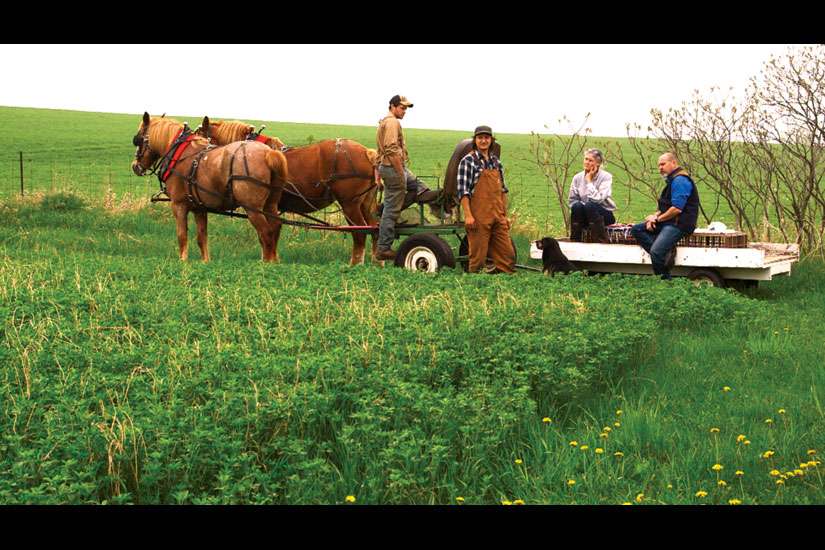Mann started work on Creation, Salt + Light Television’s new series dedicated to Church teaching on the environment, in 2011 — when there was a mild buzz among Catholic insiders about Pope Benedict XVI’s growing reputation as the “Green Pope.” Salt + Light thought its viewers would want to know more about Church teaching on the environment, and they had a perfect partner for such a project in the St. Thomas University department of environmental studies in Houston, Tex.
The head of the department at the Basilian university is Sr. Damien Marie Savino of the Franciscan Sisters of the Eucharist. She brought a lifetime of research and teaching on the environment and the Church to the project.
Mann took on the challenge as producer and director of Creation — And God Saw That It Was Good. But with breaks for Salt + Light’s usual blanket coverage of World Youth Day in Madrid in 2011 and Rio de Janeiro in 2013, to say nothing of the conclave that elected Pope Francis in 2013, progress was slow.
“Ultimately, I think it was very much just the Holy Spirit guiding it,” said Mann. “I’m glad we didn’t finish it before the encyclical. As soon as we heard there was going to be an encyclical we said, ‘Let’s just slow down a bit and wait.’”
Salt + Light Media CEO Fr. Tom Rosica calls the new series of documentaries “the most significant teaching project we’ve done at Salt + Light.”
While the series has obvious connections to Pope Francis’ major summation of Church teaching in Laudato Si’, his encyclical on “care for our common home,” it’s also rooted in an evolution of how the Church projects its teaching into the world and about the world — something that’s been building through at least the last three pontificates, said Rosica. Church teaching about nature, revelation and our humanity as expressed in the social teaching ever since Pope Leo XIII issued Rerum Novarum in 1891 finally demanded a new synthesis or summing up — which Francis took on in Laudato Si’.
“Anybody who dismisses Pope Francis efforts with Laudato Si’, who disses the whole thing, who dismisses it as some kind of personal interest project, who links it with ‘New Age’ new fangled ideas… Anybody who does that is not a Catholic and not a faithful Catholic,” said Rosica. “If they claim to be a faithful Catholic and have the audacity and the stupidity to condemn or dismiss the importance of this they are not Catholic, nor are they faithful.”
But a 40,000-word summation of Church teaching, laid out in the careful language of a pastoral and teaching pope, can’t be the only way to explain what the Church teaches, said Mann. Given that not everybody reads encyclicals, there have to be more ways of making this teaching accessible and approachable — especially to the young, he said.
“Everybody in the pews should know that God has inscribed His image or His language in creation — that creation reveals a revelation of God,” said Mann. “That’s kind of basic catechism, isn’t it? God reveals Himself through Scripture and creation… That doesn’t mean we’re deifying creation.”
The six-part series is available on DVD from SaltAndLightTV. org’s online store for $49.95. It comes with a thorough study guide Mann has designed for either Grade 11 and 12 religion and philosophy classes or for parish study groups. The series can also be viewed for free either on Salt + Light’s YouTube channel or on SaltAndLightTV.org. Eventually an expanded study guide will be available online.
The series presents leading theologians and writers explaining how a traditional, Catholic understanding of nature helps us escape both defeatism and paralysis in the face of the global ecological crisis.
“We listen to creation as a source of contemplation, as a source of prayer, as a source of spirituality,” Ghanaian Cardinal Peter Turkson, head of the Pontifical Council for Justice and Peace, tells the Salt + Light camera. “As the Psalms already say in Scriptures that in the way of creation, creation reveals God and reveals His glory to us. Creation also invites us to consider the fact that we were drawn out of it. We were drawn out of the soil. And to recognize that our whole existence depends in a very crucial and essential way on creation itself.”
Notre Dame University theologian Celia Deane Drummond lists “ecological virtues” that can help any Christian find practical ways to live in communion with nature. Her list of ecological virtues includes humility, love, joy, justice and prudence.
“Of course we spend our time talking about Jesus, who is the centre of our faith,” Rosica told The Catholic Register. “But I think the encyclical takes us one step further and asks, ‘What about this world that God so loved? Why this world that God so loved? How are we custodians of this? And that ultimate question, what kind of world are we going to leave to the future?”


